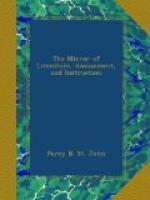that the Franciscan fathers, who were just sitting
down to dinner with some guests, left the table, and
ran with all their company into the choir, where they
were filled with wonder.” A little before,
he says, “the children are as merry as when
they were at home. The boy is friendly with every
body, but particularly with military officers, as though
he had known them all his life. He is the admiration
of all.” At the Court of Vienna the family
was received with great favour, the Emperor Francis
I. being mightily pleased with “the little magician,”
as he used playfully to call young Mozart. “There
is nothing wonderful,” said the emperor one
day, joking with him, “in playing with all the
fingers, but to play with one finger and with
the keys covered, would really be surprising.”
Upon which the child instantly performed in this manner
with as much neatness and certainty as if he had long
practised it. The father writes, “you will
scarcely believe me when I tell you how graciously
we have been received. The empress took Wolfgang
on her lap, and kissed him heartily."[5] It was at
this time that Mozart began to display the feeling
of a great artist; just before he commenced a concerto,
seeing himself surrounded by people of the Court, he
asked the emperor—“is not M. Wagenseil
here? he understands these things.”
Wagenseil was called forward to the harpsichord; “I
am going to play one of your concertos,” said
the boy, “will you turn over for me?”
[3] This lady is at present living in Salzburg, and in 1826 had not entirely given up her occupation as an instructress in piano-forte playing. Many pupils have been brought up under her, who by a peculiar neatness and precision of performance, evince the excellent tuition of Nanette Mozart.
[4] Probably at a convent.
[5] The following anecdote is recorded in the history of this journey:—Little Mozart one day, on a visit to the empress, was led into her presence by the two princesses, one of whom was afterwards the unfortunate Queen of France, Marie Antoinette. Being unaccustomed to the smoothness of the floor, his foot slipped and he fell. One of the princesses took no notice of the accident, but the other Marie Antoinette, lifted him up and consoled him. Upon which he said to her, “you are very good, I will marry you.” She related this to her mother, who asked Wolfang how he came to make this resolution. He answered, “from gratitude—she was so kind to me—whereas her sister gave herself no trouble.”
As yet Mozart had only played on keyed instruments, but on his return to Salzburg he practised privately on a little violin which he had purchased in Vienna, and, to the surprise of his father and some friends who had met to play over some new trios, he performed the second violin part, and then the first, with correctness, though without method. His horror of the sound of the trumpet in childhood, and the early passion




